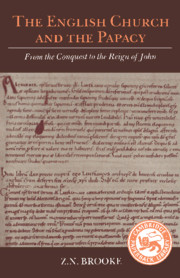Book contents
- Frontmatter
- Contents
- Foreword (1989)
- Preface
- INTRODUCTION
- PART I THE LAW OF THE CHURCH IN ENGLAND
- Chap. IV The method of this enquiry
- Chap. V Lanfranc's Collection
- Chap. VI The twelfth-century collections
- Chap. VII Medieval libraries and contemporary writers
- PART II THE RELATIONS OF ENGLAND WITH THE PAPACY
- Appendix: English Manuscripts containing collections of Ecclesiastical Law
- List of manuscripts referred to
- Index
Chap. VII - Medieval libraries and contemporary writers
from PART I - THE LAW OF THE CHURCH IN ENGLAND
Published online by Cambridge University Press: 01 February 2010
- Frontmatter
- Contents
- Foreword (1989)
- Preface
- INTRODUCTION
- PART I THE LAW OF THE CHURCH IN ENGLAND
- Chap. IV The method of this enquiry
- Chap. V Lanfranc's Collection
- Chap. VI The twelfth-century collections
- Chap. VII Medieval libraries and contemporary writers
- PART II THE RELATIONS OF ENGLAND WITH THE PAPACY
- Appendix: English Manuscripts containing collections of Ecclesiastical Law
- List of manuscripts referred to
- Index
Summary
So far I have dealt with manuscripts only. Aided by the information we have obtained from them, we can consider the two other possible sources of evidence—the catalogues of medieval libraries, and the quotations from ecclesiastical law that appear, especially in the letters of contemporaries.
Unfortunately we possess the catalogues of few medieval libraries, and only a small number of these are as early as the twelfth century. However, the evidence from such early catalogues as survive agrees entirely with the evidence derived from manuscripts. To give one or two examples. We have seen that surviving manuscripts show that in the twelfth century Lincoln possessed a copy of Lanfranc's collection and both the Decretum and Pannormia of Ivo of Chartres. The twelfth-century catalogue shows that there was a copy of Gratian also. Durham, we saw, possessed a copy of Lanfranc's collection, an abridgment of it, and a copy of Burchard; the twelfth-century catalogue mentions these three (though Burchard's work is attributed to Ivo) and includes also a copy of Ivo and a volume of Exceptiones Decretorum, probably an abridgment of Gratian. A less important library—that of Whitby Abbey—in the time of abbot Richard (1148–1175) possessed a copy of Decreta Pontificum (perhaps Lanfranc's collection), the Pannormia of Ivo, and an abridgment of Gratian. Speaking generally, Ivo is everywhere, a copy of Lanfranc's collection is usual, often we find volumes of abstracts, rarely a copy of Burchard.
- Type
- Chapter
- Information
- Publisher: Cambridge University PressPrint publication year: 1989



